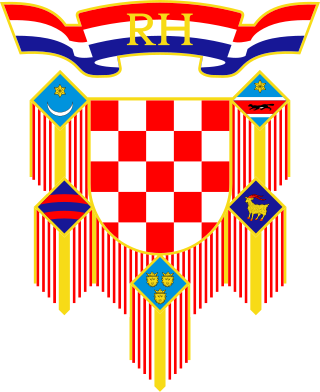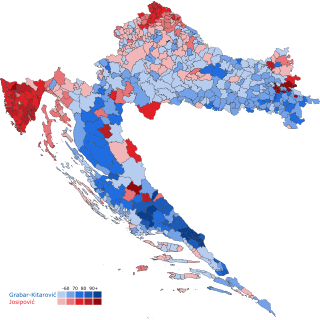
The president of Croatia, officially the president of the Republic of Croatia, is the head of state, commander-in-chief of the military and chief representative of the Republic of Croatia both within the country and abroad. The president is the holder of the highest office in Croatia. However, the president is not the head of the executive branch as Croatia has a parliamentary system in which the holder of the post of prime minister is the most powerful person within the country's constitutional framework and everyday politics.

Ivica Račan was a Croatian politician who served as Prime Minister of Croatia from 2000 to 2003, heading two centre-left coalition governments.

Ivo Sanader is a Croatian former politician who served as Prime Minister of Croatia from 2003 to 2009. He is currently serving a 18-year prison sentence for corruption in Lipovica prison.

The Croatian Democratic Union is a major conservative, centre-right political party in Croatia. Since 2016, it has been the ruling political party in Croatia under the incumbent Prime Minister Andrej Plenković. It is one of the two major contemporary political parties in Croatia, along with the centre-left Social Democratic Party (SDP). It is currently the largest party in the Sabor with 55 seats. The HDZ governed Croatia from 1990 before the country gained independence from Yugoslavia until 2000 and, in coalition with junior partners, from 2003 to 2011, and since 2016. HDZ is a member of the Centrist Democrat International, International Democracy Union, and the European People's Party, and sits in the European People's Party Group in the European Parliament. HDZ is the first political party in Croatia to be convicted of corruption.

The Social Democratic Party of Croatia is a social democratic political party in Croatia. The SDP is anti-fascist, progressive, and strongly pro-European. The SDP was formed in 1990 as the successor of the League of Communists of Croatia, the Croatian branch of the League of Communists of Yugoslavia, which had governed Croatia within the Socialist Federal Republic of Yugoslavia since World War II.
This is the history of Croatia since the end of the Croatian War of Independence.

Jadranka Kosor is a Croatian politician and former journalist who served as Prime Minister of Croatia from 2009 to 2011, having taken office following the sudden resignation of her predecessor Ivo Sanader. Kosor was the first and so far only woman to become Prime Minister of Croatia since independence.

Dražen Budiša is a Croatian politician who used to be a leading opposition figure in the 1990s and a two-time presidential candidate. As president of the Croatian Social Liberal Party through the 1990s he remains to date the only Leader of the Opposition not to have been from either the Croatian Democratic Union or the Social Democratic Party.

Zoran Milanović is a Croatian politician serving as the president of Croatia since 2020. Prior to assuming the presidency, he was prime minister of Croatia from 2011 to 2016, as well as president of the Social Democratic Party (SDP) from 2007 to 2016.
The ministry of Foreign and European Affairs of the Republic of Croatia is the ministry in the Government of Croatia which is responsible for the country's foreign relations, its diplomatic missions and relations to international organisations, especially the European Union.
Goran Granić is a former Croatian centre-left politician who was the deputy prime minister from 2000 to 2002.

The Grand Order of Queen Jelena, or more fully the Grand Order of Queen Jelena with Sash and Morning Star, is an order of the Republic of Croatia. It was established in 1995. It ranks second in the Croatian order of precedence after the Grand Order of King Tomislav.

Parliamentary elections were held in Croatia on Sunday, 4 December 2011 to elect 151 members to the Croatian Parliament. They were the sixth parliamentary election in Croatia since independence.

The Eleventh Government of the Republic of Croatia was the Croatian Government cabinet led by Prime Minister Jadranka Kosor. It was announced on 6 July 2009 and its term ended on 23 December 2011. The cabinet came into existence after Prime Minister Ivo Sanader abruptly resigned on 1 July 2009, designating Kosor as his successor and making her the first woman to serve as prime minister since Croatia gained independence in 1991. It was succeeded by the Cabinet of Zoran Milanović following the centre-left Kukuriku coalition's success in the 2011 parliamentary elections.

The Tenth Government of the Republic of Croatia was the second of two Croatian Government cabinets led by Prime Minister Ivo Sanader. It was announced on 12 January 2008 and its term ended on 6 July 2009, when Jadranka Kosor formed the 11th cabinet following Sanader's surprise resignation. Cabinet members represented parties of the ruling coalition which was formed following the 2007 parliamentary elections:

Tomislav Karamarko is a Croatian politician who served as First Deputy Prime Minister of Croatia from January to June 2016. He served in the Cabinet of Jadranka Kosor as Minister of the Interior from 2008 to 2011.
The Twelve Generals' Letter was an open letter, signed by twelve generals of the Croatian Armed Forces, that criticized the government, politicians and media for perceived criminalization of the Croatian War of Independence and asserted that war veterans had suffered undignified treatment. On 29 September 2000, a day after the letter was published by the Croatian media, Croatian President Stjepan Mesić reacted by sending into forced retirement all seven of the signatories who were active-duty officers. The affair was a source of significant controversy in Croatia and is considered one of the key events in Mesić's ten-year presidential incumbency.

Presidential elections were held in Croatia on 28 December 2014 and 11 January 2015, the sixth such elections since independence in 1991. Only four candidates contested the elections, the lowest number since 1997. Incumbent president Ivo Josipović, who had been elected as the candidate of the Social Democratic Party in 2009–2010, was eligible to seek reelection for a second and final five-year term and ran as an independent. As no candidate received 50% of the vote in the first round in December 2014, a run-off took place in January 2015 between the two candidates with the most votes, Josipović and Kolinda Grabar-Kitarović. Grabar-Kitarović went on to win the elections by a slim margin of 32,509 votes or 1.48%, making her Croatia's first female president.

Presidential elections were held in Croatia on 22 December 2019. Social Democratic Party nominee Zoran Milanović narrowly defeated incumbent president Kolinda Grabar-Kitarović in a second round of voting.
The Croatian Left has consisted of a broad range of individuals, groups, and political parties who seek egalitarian, economic, social and cultural rights in Croatia. Left-wing ideologies came to Croatia in the late 19th century during the Austria-Hungary regime. In 1894, the Social Democratic Party of Croatia and Slavonia was formed. It was the first workers party in Croatia at the time. In the Kingdom of Serbs, Croats and Slovenes the leftist movement grew but it was suppressed by the royal government. In 1920, the Communist Party of Yugoslavia was proclaimed illegal and its sympathizers were brutally persecuted after winning a large number of positions in the local elections. During the 1920s, Stjepan Radić and his Croatian Peasant Party led a centre-left agrarianism and anti-royalist policy. They were the leading Croatian political party at the time. After the assassination of Radić in 1929, the Croatian Peasant Party was taken over by Vlatko Maček who enforced a more conservative and nationalist rhetoric. During the Socialist Yugoslavia era, the League of Communists of Yugoslavia was the only legal party in the country. In 1990, political plurality was restored and a number of left-wing parties emerged with the most notable one being the Social Democratic Party of Croatia.














